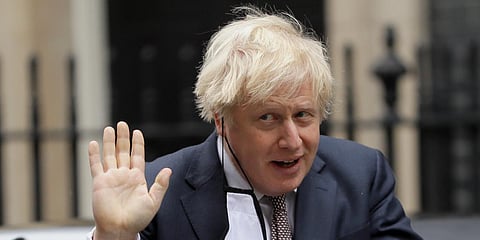

LONDON: British Prime Minister Boris Johnson will fly to Brussels this week for crunch talks to try and break the deadlock with the European Union (EU) over a post-Brexit trade agreement ahead of the December 31 deadline.
The clock is ticking for the end of the Brexit transition period and unless the UK and EU are able to thrash out and ratify a deal by the end of this month, Britain will have left the 27-member economic bloc on January 1, 2021, with the prospect of tariffs on goods as both sides trade on World Trade Organisation (WTO) terms.
"I'm always hopeful, but I've got to be honest, the situation at the moment is very tricky," Johnson told the BBC.
But he added that he remained optimistic and hopes for "the power of sweet reason".
"We will see where we get to in the course of the next two days, but I think the UK government's position is that we are willing to engage at any level, political or otherwise, we are willing to try anything. But there are just limits beyond which no sensible, independent government or country could go and people have got to understand that," he said.
Johnson and European Commission President Ursula von der Leyen issued a joint statement on Monday night after their respective Chief Negotiators, Michel Barnier and Lord David Frost, failed to overcome the final hurdles in three key areas of divergence.
"We agreed that the conditions for finalising an agreement are not there due to the remaining significant differences on three critical issues: level playing field, governance and fisheries, the joint statement noted.
"We asked our Chief Negotiators and their teams to prepare an overview of the remaining differences to be discussed in a physical meeting in Brussels in the coming days," it said.
The two leaders spent over an hour talking on the phone on Monday night but failed to resolve any of the key remaining differences.
While no date has been set for their face-to-face meeting, it is expected either before or after a scheduled EU summit on Thursday.
Barnier and Frost, meanwhile, will meet on Tuesday to draw up a list of the outstanding differences between the two sides, ahead of the EU summit.
The UK and EU have been trading for years without paying tariffs or conducting customs or border checks, all of which is set to change at the end of the Brexit transition period unless they are able to agree a new pact.
The major stumbling blocks to such a pact remain a set of shared rules and standards, or level playing field, to ensure businesses in one country do not have an unfair advantage over their competitors in others.
Brussels wants the UK to follow EU rules closely in areas such as workers' rights and environmental regulations, but Britain says the very basis of the Brexit vote in the June 2016 referendum was to break free from following common rules and reassert national sovereignty.
Linked with this, is the disagreement over how any future trading disputes should be resolved and the role of the European Court of Justice in Luxembourg.
Another area of divergence is fishing, with the EU is warning that without ongoing access to UK waters for its fleets, UK fishermen will no longer have special access to EU markets to sell their goods.
With the UK keen to assert sovereign control over its territorial waters, with the issue seen more of a matter of pride.
France has been at the head of a group of countries, including the Netherlands, Spain and Italy, resisting any attempt to give ground on fishing rights or the level playing field.
Germany, which holds the rotating EU presidency, Sweden and eastern European states are understood to be keener to find a compromise if European unity is maintained.
Irish foreign minister Simon Coveney summed things up to say that a deal would require a change in approach.
"The next two days need to be very different to the last two days. In Brussels certainly the mood is starting to shift to contingency planning for a no-deal," he warned.